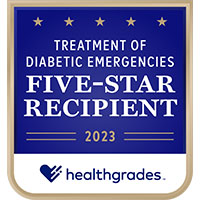All Emergency Room Services
Emergency Room Locations
Whether it’s a broken bone, high fever or a more severe medical emergency like a heart attack, we are ready to pro...
When to Go to an ER
Find out what constitutes a medical emergency and when you should visit an emergency room or ER.
Hospital & ER Safety
Come to our hospital knowing that we do everything possible to keep patients and staff safe.
Emergency Healthy Living
Saint Vincent Hospital provides helpful emergency health articles and tips to keep you in the know on trending topics, c...
Exception occurred while executing the controller. Check error logs for details.
Practicing Social Distancing
It is time to go the distance. Literally. Fight against the spread of illnesses by practicing social distancing.
By practicing social distancing, you are keeping yourself, your loved ones and the community safe.
Take care!
SOURCE
Centers of Disease Control and Prevention
Red Cross
What is it?
Social distancing means increasing the physical space (at least six feet) between you and other people in public. Maintaining this distance from other people, especially if your health is at risk, lessens your chances of catching illnesses, such as COVID-19.How can I do this?
The easiest way to practice social distancing is by avoiding mass gatherings and staying at home as much as possible. Other ways to apply this to your daily routine, include:- Groceries: Try purchasing your groceries online or going at odd hours when fewer people are around. If your health is at risk, ask a close friend or family member if they can help.
- Fast Food/Restaurants: If available, choose to have your favorite dish delivered right to your door.
- Physical Activity: If you’d like to go outside to stretch your legs, choose a less-traveled route. You can also work out indoors by choosing from a variety of free workout videos online to follow.
- Work: If you can work from home, set up conference calls with your team to avoid large gatherings.
- Education: If you or your child is temporarily out of school, check with teachers for online resources to continue education from home.
- Travel: Cancel all travel plans to avoid crowds and airplanes. Take this time to plan out your next trip when it is safe for you and your loved ones.
- Public Transportation: If you need to leave the house, take your own car. If public transportation is your only option, bring disinfectant wipes to clean the seat and wash your hands when you arrive at your destination.
- Relationships: Even though you’re taking time away from seeing those closest to you in person, this is the perfect time to build your relationships by checking in on them through a phone call, text or video chat.
How can I stay occupied?
After working and taking care of your family, there might be a period where you are itching to go out. We have a few ideas to keep you occupied:- Read: Dive into a book you have been wanting to read or find a new one online and have it shipped to you within a few days.
- Learn: Take advantage of free online educational courses to learn a skill you have always wanted to add to your resume.
- Cook: Try out a new recipe or look online for recipes that will make enough food to last all week, such as chicken fajitas.
- Clean: It is time to give your closet the attention it deserves. Organize the chaos, and place everything you can to the side for donation.
What if I don’t live alone?
If you do not live alone, please share the importance of social distancing with those you live with, clean the house often and keep your distance as much as possible. If they become sick:- Put together a separate room for them to stay in.
- Wear facemasks around each other.
- Wash your hands often.
- Do not touch your eyes, nose and mouth.
- Do laundry and clean the house as much as possible.
- Avoid having visitors.
By practicing social distancing, you are keeping yourself, your loved ones and the community safe.
Take care!
SOURCE
Centers of Disease Control and Prevention
Red Cross

 The Emergency Room (ER) at Saint Vincent Hospital provides you with access to nationally renowned experts in emergency medicine, toxicology, cardiac problems, trauma, and more when you need them most. At the Saint Vincent Hospital Emergency Room, you’ll find:
The Emergency Room (ER) at Saint Vincent Hospital provides you with access to nationally renowned experts in emergency medicine, toxicology, cardiac problems, trauma, and more when you need them most. At the Saint Vincent Hospital Emergency Room, you’ll find: